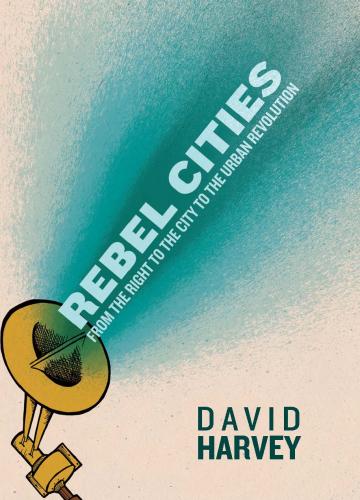REBEL CITIES
From the Right to the City
to the Urban Revolution
David Harvey
London • New York
First published by Verso 2012
© David Harvey
All rights reserved
The moral rights of the author have been asserted
1 3 5 7 9 10 8 6 4 2
Verso
UK: 6 Meard Street, London W1F 0EG
US: 20 Jay Street, Suite 1010, Brooklyn, NY 11201
Verso is the imprint of New Left Books
eISBN-13: 978-1-84467-904-1
British Library Cataloguing in Publication Data
A catalogue record for this book is available from the British Library
Library of Congress Cataloging-in-Publication Data
Harvey, David, 1935–
Rebel cities : from the right to the city to the urban revolution / David Harvey.
p. cm.
Includes bibliographical references and index.
ISBN 978-1-84467-882-2 (alk. paper) -- ISBN 978-1-84467-904-1
1. Anti-globalization movement--Case studies. 2. Social justice--Case studies.
3. Capitalism--Case studies. I. Title.
HN17.5.H355 2012
303.3’72--dc23
2011047924
Typeset in Minion by MJ Gavan, Cornwall
Printed in the US by Maple Vail
For Delfina
and all other graduating students everywhere
Contents
Preface: Henri Lefebvre’s Vision
Section I: The Right to the City
2 The Urban Roots of Capitalist Crises
3 The Creation of the Urban Commons
5 Reclaiming the City for Anti-Capitalist Struggle
6 London 2011: Feral Capitalism Hits the Streets
7 #OWS: The Party of Wall Street Meets Its Nemesis
PREFACE
Henri Lefebvre’s Vision
Sometime in the mid 1970s in Paris I came across a poster put out by the Ecologistes, a radical neighborhood action movement dedicated to creating a more ecologically sensitive mode of city living, depicting an alternative vision for the city. It was a wonderful ludic portrait of old Paris reanimated by a neighborhood life, with flowers on balconies, squares full of people and children, small stores and workshops open to the world, cafés galore, fountains flowing, people relishing the river bank, community gardens here and there (maybe I have invented that in my memory), evident time to enjoy conversations or smoke a pipe (a habit not at that time demonized, as I found to my cost when I went to an Ecologiste neighborhood meeting in a densely smoke-filled room). I loved that poster, but over the years it became so tattered and torn that I had, to my great regret, to throw it out. I wish I had it back! Somebody should reprint it.
The contrast with the new Paris that was emerging and threatening to engulf the old was dramatic. The tall building “giants” around the Place d’Italie were threatening to invade the old city and clasp the hand of that awful Tour Montparnasse. The proposed expressway down the Left Bank, the soulless high-rise public housing (HLMs) out in the 13th arrondissement and in the suburbs, the monopolized commodification on the streets, the plain disintegration of what had once been a vibrant neighborhood life built around artisanal labor in small workshops in the Marais, the crumbling buildings of Belleville, the fantastic architecture of the Place des Vosges falling into the streets. I found another cartoon (by Batellier). It showed a combine harvester crushing and gobbling up all the old neighborhoods of Paris, leaving high-rise HLMs all in a neat row in its wake. I used it as key illustration in The Condition of Postmodernity.
Paris from the early 1960s on was plainly in the midst of an existential crisis. The old could not last, but the new seemed just too awful, soulless and empty to contemplate. Jean-Luc Godard’s 1967 film, Deux ou trois choses que je sais d’elle, captures the sensibility of the moment beautifully. It depicts married mothers engaging in a daily routine of prostitution, as much out of boredom as of financial need, against the background of an invasion of American corporate capital into Paris, the war in Vietnam (once a very French affair but by then taken over by the Americans), a construction boom of highways and high-rises, and the arrival of a mindless consumerism in the streets and stores of the city. However, Godard’s philosophical take—a kind of quizzical, wistful, Wittgensteinian precursor to postmodernism, in which nothing at the center of either the self or society could possibly hold—was not for me.
It was also in this very same year, 1967, that Henri Lefebvre wrote his seminal essay on The Right to the City. That right, he asserted, was both a cry and a demand. The cry was a response to the existential pain of a withering crisis of everyday life in the city. The demand was really a command to look that crisis clearly in the eye and to create an alternative urban life that is less alienated, more meaningful and playful but, as always with Lefebvre, conflictual and dialectical, open to becoming, to encounters (both fearful and pleasurable), and to the perpetual pursuit of unknowable novelty.1
We academics are quite expert at reconstructing the genealogy of ideas. So we can take Lefebvre’s writings of this period and excavate a bit of Heidegger here, Nietzsche there, Fourier somewhere else, tacit critiques of Althusser and Foucault, and, of course, the inevitable framing given by Marx. The fact that this essay was written for the centennial celebrations of the publication of Volume 1 of Capital bears mentioning because it has some political significance, as we shall see. But what we academics so often forget is the role played by the sensibility that arises out of the streets around us, the inevitable feelings of loss provoked by the demolitions, what happens when whole quarters (like Les Halles) get re-engineered or grands ensembles erupt seemingly out of nowhere, coupled with the exhilaration or annoyance of street demonstrations about this or that, the hopes that lurk as immigrant groups bring life
